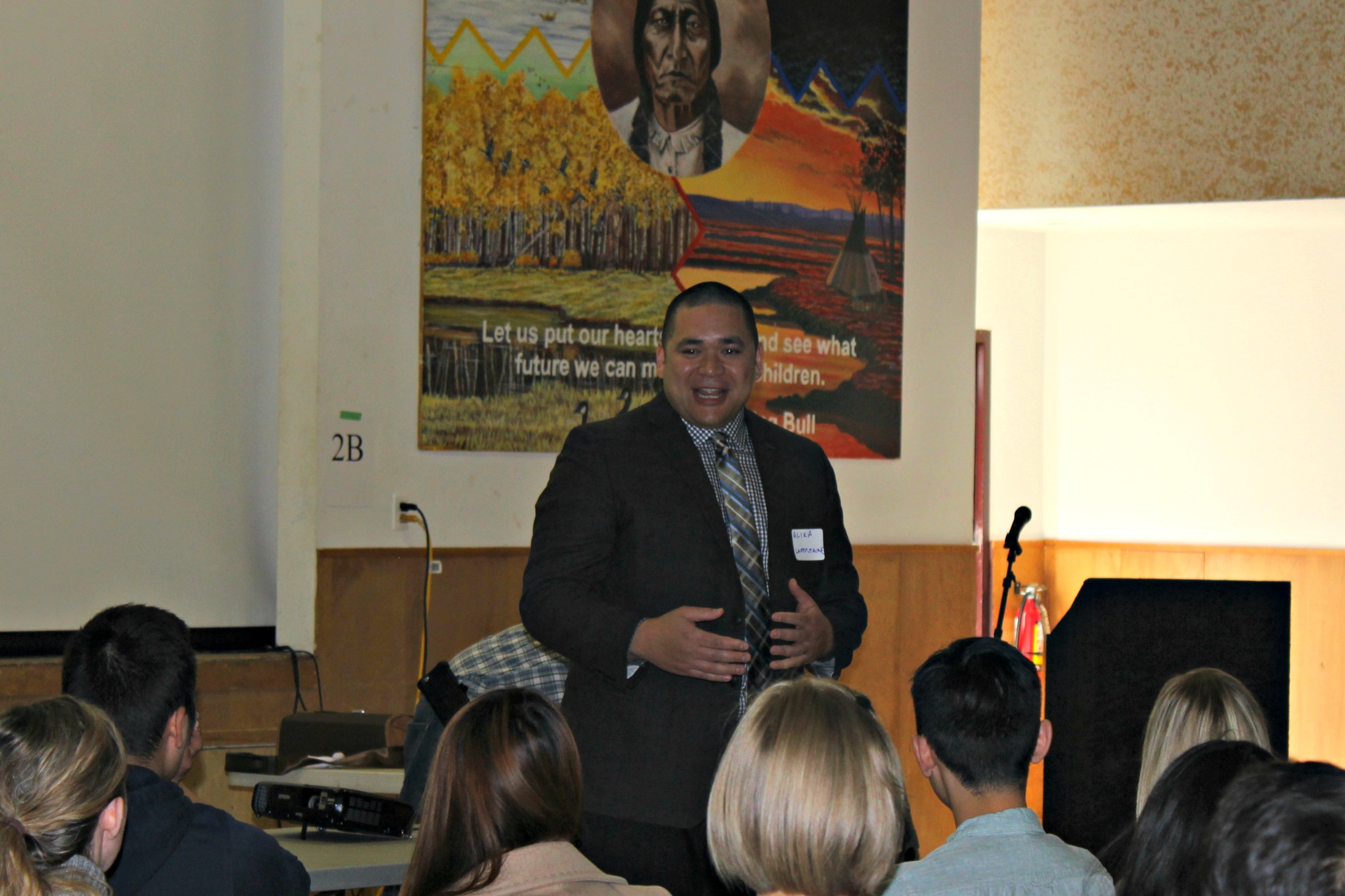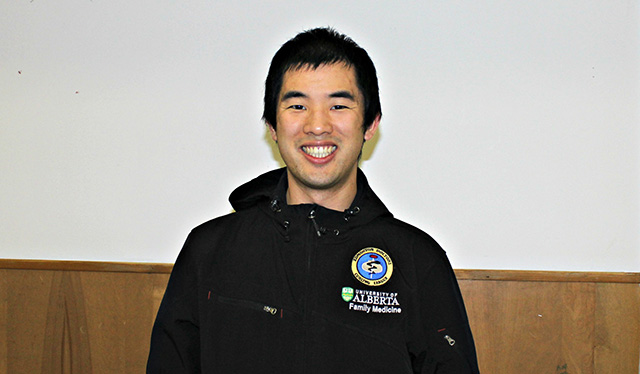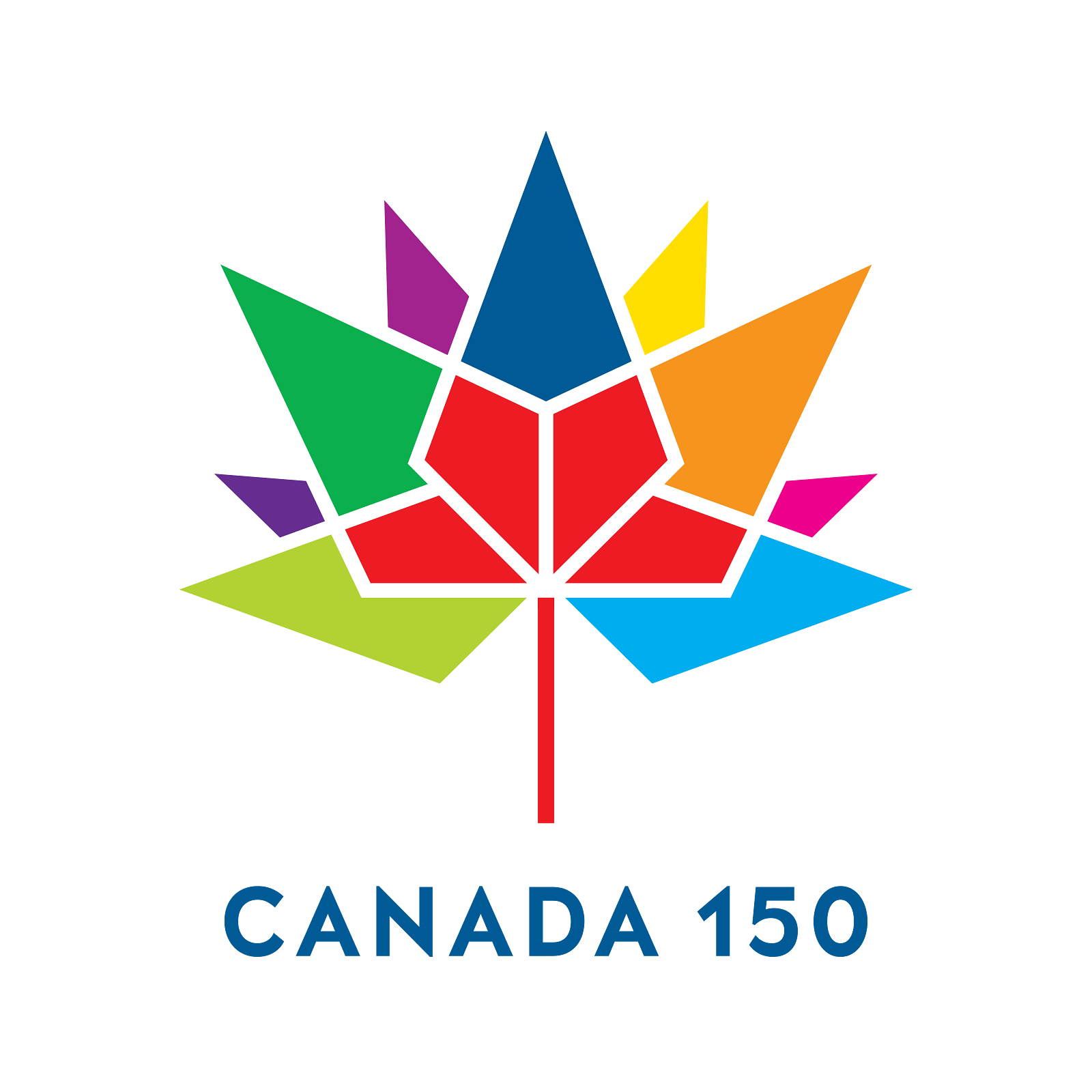
Alika Lafontaine speaks to family medicine residents at Alexis Nakota Sioux Nation
In September, first- and second-year family medicine residents left their regular work and study environments within hospitals and clinics and spent the day at Alexis Nakota Sioux Nation. The young physicians were there to learn about the culture, health issues and barriers to health care faced by Indigenous communities from the members themselves. It was a unique opportunity for the trainees to be welcomed into a community, meet its members and be immersed in its culture.
Working together
Cara Bablitz, a graduate of UAlberta's medical school was inspired to organize this event after working with the Indigenous Health Program to deliver primary care at the Alexis Nakota Sioux Nation and meeting community members. Bablitz thought their experiences were important to share with students. She worked with Samantha Horvey and Keith Huber, both of whom aspired to deliver a unique, meaningful experience to the family medicine residents.
Bablitz's own career in Indigenous health started when she began medical school in 2007. Her father who is a Métis physician has been a source of inspiration work to reduce health inequities.
"I feel it is important to educate students on health disparities among Indigenous people, who have alarmingly high rates of conditions such as depression, suicide, arthritis, obesity and diabetes," says Bablitz. "This has been supported with calls to action by the Truth and Reconciliation Commission Report."
The Truth and Reconciliation Commission called medical schools to action: "We call upon medical and nursing schools in Canada to require all students to take a course dealing with Aboriginal health issues, including the history and legacy of residential schools, the United Nations Declaration on the Rights of Indigenous Peoples, Treaties and Aboriginal rights, and Indigenous teachings and practices. This will require skills-based training in intercultural competency, conflict resolution, human rights, and anti-racism." (Truth and Reconciliation Commission: Calls to Action, 2015, p.3)
Bablitz believes the University of Alberta has an opportunity to improve Indigenous health through education and collaboration with Indigenous champions. "We need to work together towards improving cultural competency and anti-racism both in pre-clinical and clinical years," says Bablitz.
"It was a great first step partnering with the Alexis Nakota Sioux Nation, a band invested in improving health outcomes, who enthusiastically worked with us to plan and host this event," adds Bablitz. "I hope that the University of Alberta will continue to support further educational events in Indigenous Health."


Resident Benny Lee
Moving forward
One of the speakers was Alika Lafontaine, a University of Alberta clinical lecturer and anesthesiologist based in Grande Prairie. He serves as a member of the Board of Governors for First Nations University of Canada and as a Collaborative Team Leader for Indigenous Health Alliance. His perspective as an Indigenous physician and advocate was invaluable to the residents.
Lafontaine himself saw the event as a positive step towards improving inclusivity in health care, but emphasizes it's only the beginning of what medical schools need to be doing. He says there has been a big push in medicine to get away from volume-based style of treatment where physicians go through a long list of procedures as efficiently as possible, to making sure that they are providing care in a way that provides a space for patients to talk about what the procedures and interventions mean to them.
"Those sort of conversations don't happen with Indigenous people often because we don't provide these interfaces," says Lafontaine. "Having this event happen on Alexis First Nation is something that we [the university] take for granted, but that was the first time that a group that big has gone to Alexis, and I wouldn't be surprised if it was one of the first times this has happened in Alberta."
"You can't underestimate how important that day was to the community," says Lafontaine.
Lafontaine notes that although small changes may give the illusion of health care becoming more inclusive, it is not there yet.
"For patients dealing with ongoing chronic diseases and emergency situations, to come into a care situation and feel hostility, stereotyping and discrimination, that's not good enough," he says.
"We're trained as scientists as well as physicians, we need to make sure we measure ourselves in a very scientific way," says Lafontaine. "The only way we can do that is by focusing on metrics that make a difference. Do patients feel safe when they interact with us? Do they feel that there is empathy in the physician-patient relationship, and do they feel that they're getting access to services, and are physicians providing those services?"
According to Lafontaine, it is important for medical schools to create the space for learning about Indigenous health care. As a physician and clinical lecturer, he knows there are many things that medical students need to learn, and many things residents are trained to be proficient in. However, as he notes, "the things we train our students in are a reflection of what we think is important."
"I know that the patients and the leadership that attended that session were blown away. They were blown away that their local physicians and physicians-in-training would go out and actually do this," says Lafontaine. "To us it's taking a bit of time out of our day, but for them this is something they've never experienced before."
"The impact that our medical schools can have in our Indigenous communities in Alberta can be enormous."
For almost as long as there's been a Canada, there's been a University of Alberta. Over the next year, in honour of Canada's 150th anniversary, we're proudly celebrating the people, achievements and ideas that contributed to the making of a confederation.
